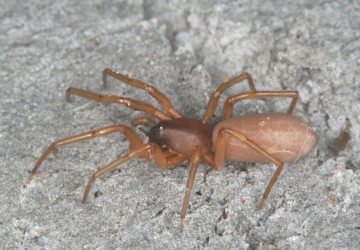Summary for Harpactea rubicunda (Araneae)
previous species | next species
National Distribution
Terms of Use. Double-click on map to go to region

Explore Regional Distribution
Please log on and add a note on this species
About this species
Recorded altitude range
Species text
DistributionThe species appears to be confined to the Grays area in Essex. Hambler & Linfield (1991) suggest that the spider may be widespread in parts of southern Essex and may eventually be found to be much more widespread in south-eastern England. However, comprehensive survey in south Essex including the use of pitfall traps in many suitable locations has failed to record the species, despite the wide range in the region identified for Zodarion italicum, a species with somewhat similar habitat preferences. H. rubicunda is also known from central and eastern Europe.
Habitat and ecology
Hambler and Linfield (1991) describe the species as appearing thermophilous in Britain, occurring under stones, tarmac debris, rubble, bricks and doubtless other materials in a variety of sites including waste ground and rough grassland. What is thought to be the original location of the spider's discovery is an area of breeze block debris on the side of a chalk quarry in Chafford Hundred, Grays. In Europe it apparently occurs in a variety of habitats, including fields, woodlands, gardens and buildings. Adults have a long season, both sexes being found throughout the year.
Status
H. rubicunda has a very restricted area of occupancy. It was evidently found in numbers in the Tilbury area of Essex in 1988 (Hambler & Linfield 1991), but there have been no further records reported until it was found again in 2005 at what is thought to be the original location in a chalk quarry. This is the only known location. The site is under threat from natural succession and prone to damage from human activities.
Threats
Since 2005 the chalk quarry where the spider is recorded has been under Essex Wildlife Trust ownership and management and the location and needs of the spider are known to the Trust, but the breezeblock debris is becoming covered in scrub and there has been quite extensive planting of saplings and scrub in nearby parts of the quarry as part of 'landscaping' associated with the massive Chafford Hundred housing development that took place between the 1990s and 2005. It is uncertain whether Hambler & Linfield recorded the species at other sites in the area, or where these were, but virtually all the brownfield land in the Tilbury area is either already lost to development or will be developed in the near future.
Management and conservation
The spider's habitat needs to be kept open through periodic scrub clearance. The spider has not subsequently been found in apparently suitable habitat elsewhere in the area, but retention of open habitat with rocks and stones through periodic scrub clearance and small scale disturbance undertaken on a rotational basis would be required.
Text based on Dawson, I.K., Harvey, P.R., Merrett, P. & Russell-Smith, A.R. (in prep.). References
Adult Season
Habitats
background methodology
Recorded management for locations with Harpactea rubicunda
Recorded substrate and hydrology for locations with Harpactea rubicunda
Images
please log on and upload a new image for this speciesSee also A-Z Species Index - A-Z Picture Index - previous species | next species
